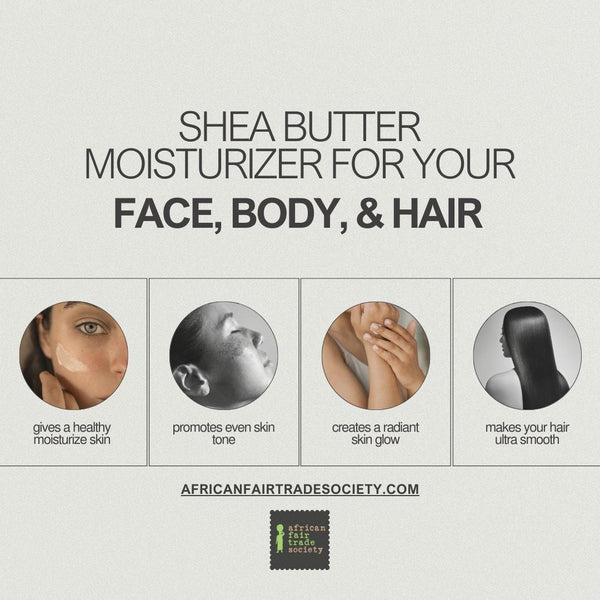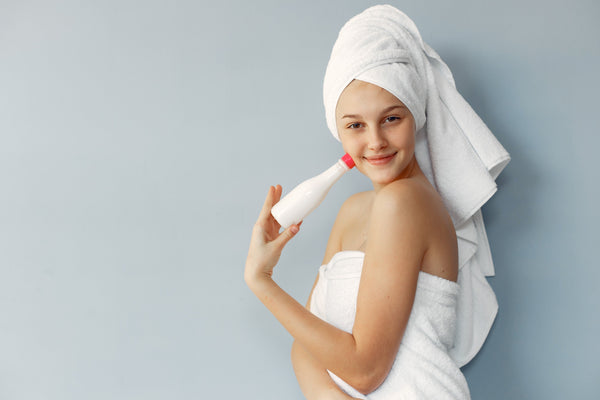Shea Butter vs Lotion: Understanding the Basics

When it comes to keeping your skin moisturized and healthy, you've got options galore. But two contenders often duke it out for the top spot in our skincare routines: shea butter and lotion. Let's dive into this moisturizing matchup and see how these two heavyweights stack up against each other.
Shea butter, oh boy, where do we start? This creamy, nutrient-rich substance is extracted from the nuts of the shea tree, native to West Africa. It's been used for centuries as a natural moisturizer and has gained quite the following in recent years. On the other hand, lotion is a catch-all term for a variety of moisturizing products typically made with water, oils, and emulsifiers.
Now, you might be thinking, "Aren't they basically the same thing?" Well, hold your horses! While both aim to keep your skin hydrated, they go about it in different ways. Shea butter is a natural, single-ingredient product, while lotions often contain a cocktail of ingredients, some natural and some not-so-natural.
Let's break it down further:
- Texture: Shea butter is thick and creamy, while lotions are usually lighter and more easily absorbed.
- Ingredients: Shea butter is 100% natural (when pure), whereas lotions can contain a mix of natural and synthetic ingredients.
- Application: Shea butter requires a bit more effort to apply, while lotions spread easily.
But don't just take our word for it! According to a study published in the Journal of Oleo Science, shea butter has "anti-inflammatory and antioxidant properties" that can benefit the skin in various ways. Now that's something to write home about!
The Benefits of Shea Butter for Skin Care
Alright, let's cut to the chase - shea butter is like the Swiss Army knife of skincare. It's packed with vitamins and fatty acids that make it a powerhouse for your skin. Here's why you might want to give this natural wonder a whirl:
- Deep Moisturization: Shea butter doesn't mess around when it comes to hydration. Its high concentration of fatty acids and vitamins penetrates deep into the skin, providing long-lasting moisture.
- Anti-Inflammatory Properties: Got sensitive skin? Shea butter might be your new best friend. Its anti-inflammatory properties can help soothe irritated skin and reduce redness.
- Natural Sun Protection: While it's no substitute for your SPF, shea butter does offer some natural sun protection. It's like having a little extra shield against those pesky UV rays.
- Anti-Aging Effects: Thanks to its vitamin E content, shea butter can help fight the signs of aging. It promotes skin elasticity and may reduce the appearance of fine lines and wrinkles.
- Versatility: From head to toe, shea butter's got you covered. Use it on your face, body, hands, feet - heck, even your hair!
But here's the kicker - not all shea butter is created equal. The quality can vary widely depending on how it's processed. That's where companies like the African Fair Trade Society come in, ensuring you get the good stuff.
Lotion: Advantages and Limitations
Now, let's not throw the baby out with the bathwater - lotions have their place in the skincare world too. They're like the jack-of-all-trades in your moisturizing arsenal. Here's what lotions bring to the table:
- Easy Application: Lotions are typically lighter and spread more easily than shea butter. They're perfect for a quick moisture boost on the go.
- Variety of Formulations: From lightweight day creams to rich night lotions, there's a formulation for every skin type and concern.
- Additional Ingredients: Many lotions contain added ingredients like sunscreen, anti-aging compounds, or fragrances. It's like getting a little extra bang for your buck.
- Rapid Absorption: Lotions are often water-based, allowing them to absorb quickly into the skin without leaving a greasy residue.
But (and it's a big but), lotions aren't without their drawbacks:
- Synthetic Ingredients: Many lotions contain artificial preservatives, fragrances, and other synthetic ingredients that may irritate sensitive skin.
- Less Intensive Moisturization: While lotions provide surface-level hydration, they may not offer the deep, long-lasting moisture of shea butter.
- Frequent Reapplication: Due to their lighter formulation, lotions often need to be reapplied more frequently than shea butter.
It's worth noting that the effectiveness of lotions can vary greatly depending on their ingredients. As the International Journal of Cosmetic Science points out, "The efficacy of moisturizers depends on their composition and the type of ingredients used".
Comparing Shea Butter and Lotion: Which is Better?
Now, drumroll please... it's time for the main event: shea butter vs lotion. Who will come out on top in this skincare showdown?
| Feature | Shea Butter | Lotion |
|---|---|---|
| Moisturization | Deep, long-lasting | Surface-level, may require frequent reapplication |
| Ingredients | 100% natural (when pure) | Mix of natural and synthetic |
| Absorption | Slower, may leave residue | Quick, typically non-greasy |
| Versatility | Multi-purpose | Often formulated for specific uses |
| Cost-effectiveness | A little goes a long way | May need to use more product |
But here's the thing - it's not really about which is "better." It's about what works best for your skin and your needs. Some folks swear by the pure, intensive moisturization of shea butter, while others prefer the lightweight feel of lotion.
That being said, if you're looking for a natural, multi-purpose moisturizer that packs a serious hydration punch, shea butter might just be your golden ticket. It's particularly beneficial for those with dry or sensitive skin, or anyone looking to simplify their skincare routine.
How to Incorporate Shea Butter into Your Skincare Routine
Ready to give shea butter a whirl? Here's how to make the most of this natural wonder:
- As a Daily Moisturizer: After cleansing, warm a small amount of shea butter between your palms and apply to your face and body.
- For Intensive Treatment: Use as an overnight mask for extra dry areas like elbows, knees, and feet.
- Hair Care: Tame frizz and add shine by applying a tiny amount to your hair ends.
- Lip Balm: Dab a bit on your lips for natural, long-lasting hydration.
- After-Sun Care: Apply to sun-exposed skin to soothe and moisturize.
Remember, with shea butter, a little goes a long way. Start with a small amount and adjust as needed.
The African Fair Trade Society Difference
Now, you might be wondering, "Where can I get my hands on some high-quality shea butter?" Well, look no further than the African Fair Trade Society. Here's why our shea butter stands head and shoulders above the rest:
- 100% Pure: We offer unrefined, organic shea butter with no additives or preservatives. It's as natural as it gets!
- Fair Trade: We work directly with women's cooperatives in West Africa, ensuring fair wages and sustainable practices.
- High Quality: Our shea butter is carefully processed to preserve its natural benefits and rich nutrient profile.
- Eco-Friendly: We're committed to sustainable harvesting and production methods, so you can feel good about your purchase.
- Versatile: Whether you're using it for skincare, haircare, or even cooking, our shea butter has got you covered.
In conclusion, while both shea butter and lotion have their merits, the pure, natural goodness of shea butter is hard to beat. It's a versatile, effective moisturizer that's been trusted for generations.
Ready to experience the difference for yourself? Visit the African Fair Trade Society website to get your hands on some premium, ethically sourced shea butter. Your skin (and conscience) will thank you!





